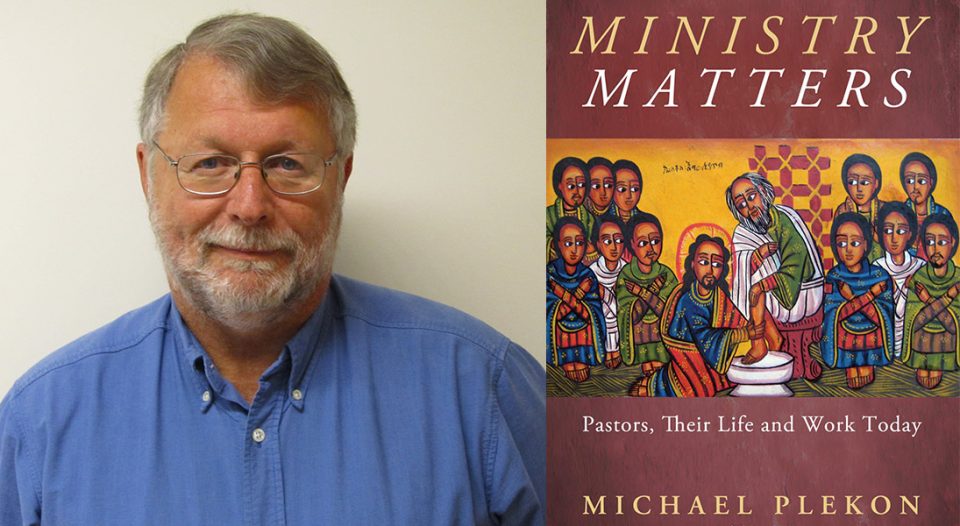Michael Plekon wears a lot of hats. He has been a minister in both Western and Eastern traditions for over 40 years, as well as a teacher and scholar. His book Ministry Matters: Pastors, Their Life and Work Today (Cascade Books, 2024) explores the role of the modern pastor, as congregations shift and change.
Whereas Plekon’s last book, Community as Church, Church as Community (Cascade, 2021), covered the shrinking of the traditional parish and how congregations have revitalized, Ministry Matters is a thoughtful highlighting of several featured pastors—intended to shed light on clergy, yes, but also written for readers who aren’t ministers or in church leadership. Living Lutheran spoke with him about the book.
Living Lutheran: Could you tell us about your Ministry Matters?
Plekon: Ministry Matters is a follow-up to a book I published earlier, Community as Church, Church as Community … [which] sought to look both sociologically and theologically at the decline, the shrinkage of congregations in the U.S. Alongside parish work, I was a professor of sociology and religious studies at the City University of New York’s Baruch College for 40 years. So, from both my professions, I wanted to look carefully at what was happening in parishes.
The data on religious decline is there. But I then sought to look at what was happening through the lens of what is central to the gospel and our faith: the dying and rising of Christ. Inherent in communities of faith are those ordained to lead them in worship, learning and service—the [rostered ministers]. I could not cover them adequately in the first book, hence Ministry Matters, a second one.
What prompted you to research and write the book?
My training in the sociology of religion under the late Peter L. Berger, an internationally renowned scholar and a Lutheran, who also contributed several important theological reflections in his writing. But also, it was my 40-plus years of working in parish ministry alongside other pastors that urged me to do this second book. In it, I listened carefully, as I have in other of my books, to a number of pastors whose pastoral and theological voices I have come to revere.
I was hoping to hear what they understood the ordained ministry to be, what leading the people of God required.
Was there anything in your research that really surprised you or that you found especially encouraging?
I was not looking for a “recipe book” from these remarkable pastors. Rather, I was hoping to hear what they understood the ordained ministry to be, what leading the people of God required. Among those I listened to are Anglican and Episcopal priests and theologians Sam Wells, Barbara Brown Taylor, Sarah Coakley, Rowan Williams and Cathie Caimano, who calls herself a “free-range priest.”
I also listened to Methodist bishop and scholar Will Willimon and Henri Nouwen, who was a Catholic priest and counselor and spiritual director. In what became a very ecumenical listening, I included Lutheran pastor Nadia Bolz-Weber, as well as Eastern Orthodox priest and scholar Nicholas Afanasiev and Pope Francis. I also drew on a good friend’s pastoral experience, Episcopal priest George Keith, and I leaned on some of my own experience.
What message do you think your book may have specifically for Lutherans?
Lutherans will find much of what these fine writers and pastors have to say as familiar in the best sense. They will hear about pastors as persons of prayer, discernment and reconciliation. In our very divided country, no congregation escapes conflict. But as these writers witness, the letters of Paul and others in the New Testament show us this is part of trying to walk with Jesus, unavoidable if one is attempting to act as citizens of the kingdom. Lutherans will find that keeping Christ at the heart of our lives is what unites these pastors across their church backgrounds, from Pope Francis to Bishop Will Willimon.
How are you hoping readers will engage with your book as you send it into the world?
I hope that my colleagues in the ordained ministry will find much that is worthwhile in this book. But I very much intended it to be accessible, to speak to all the people of God. Central to both books is that we are all in this together, that we are all followers of the Lord, all called to ministry in baptism and gathered every Sunday in the eucharist. And then sent out to stand up for God’s ways and to do what God does in the world.





